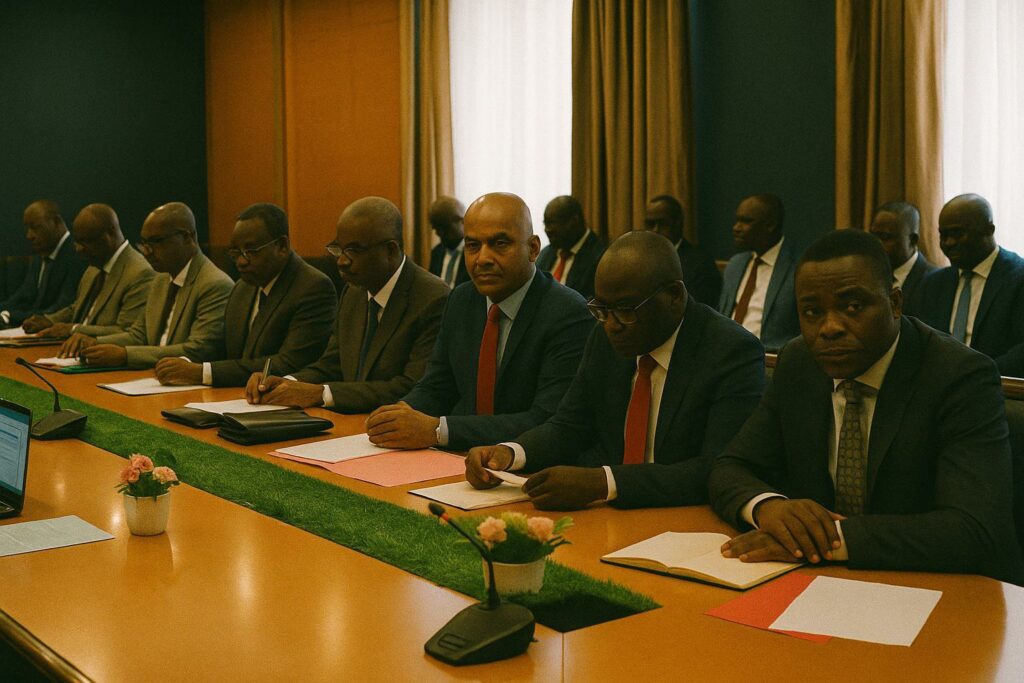Lawmakers pivot from approval to performance scrutiny
In a sign of institutional consolidation, the Economic, Financial and Budgetary Control Commission of Congo-Brazzaville’s National Assembly moved from legislative drafting to hands-on performance verification. Convened on 1 July in Brazzaville, the body launched what its first vice-president Thierry Hobié described as a “pedagogical but firm” outreach to companies benefitting from establishment conventions, the legal instruments that grant multi-year tax holidays and customs rebates to qualifying investors. The move marks a departure from the perception that once an incentive package is signed the public sector’s role becomes merely facilitative. Deputies now insist that measurable socio-economic returns—particularly employment creation—be periodically demonstrated.
The architecture of establishment conventions in comparative context
Congo-Brazzaville’s investment charter, adopted in 2003 and amended in 2021, empowers the executive to negotiate bespoke conventions with strategic investors. Similar frameworks exist across Central Africa, yet analysts at the Economic Commission for Africa note that the Congolese model is among the most generous in terms of import-duty exemptions during the start-up phase (ECA 2023). The latest UNCTAD World Investment Report classifies the country as an “emerging reformer” for coupling incentives with clear localisation clauses (UNCTAD 2024). By mandating local workforce ratios and technology transfer, the conventions seek to maximise domestic value addition without deterring capital inflows.
Inter-agency missions set to visit factory floors
Technical teams composed of officials from the Directorate-General of Taxes, the Directorate-General of Customs, and the Congolese Employment Agency will join parliamentary staff in inspecting beneficiary plants. According to Deputy Paul Matombé, a commission member, site visits will verify payroll wp-signup.phps, procurement logs and compliance with environmental standards. The methodology borrows from the World Bank’s Investment Climate Project, which emphasises joint monitoring to avoid fragmented oversight (World Bank 2023). Early discussions have already taken place with executives from ten firms in agribusiness, timber processing, and light manufacturing, sectors singled out in the National Development Plan 2022-2026 for their job-multiplying potential.
Private sector optics: cooperation tempered by caution
Company representatives interviewed after the closed-door session expressed broad support for what one manager called a “rules-based ecosystem that rewards performers and disciplines free-riders.” Yet some voiced apprehension that parallel audits by tax and customs officials could disrupt operations. The director of a wood-processing venture noted that certain machinery still awaits spare parts delayed at Pointe-Noire port, cautioning that productivity metrics must be contextualised. The commission responded by pledging swift coordination with the Ministry of Finance to ensure that legitimate procedural bottlenecks do not skew compliance assessments.
Employment targets at the heart of public expectations
With youth unemployment estimated at 20 percent in urban centres by the African Development Bank, the social contract implicit in incentive regimes is receiving heightened scrutiny. Lawmakers emphasise that conventions constitute mutual commitments: the state foregoes immediate revenue, and companies reciprocate through job creation, skills transfer and broadened tax bases over time. The Congolese Employment Agency plans to match qualified graduates with vacancies identified during the inspections. Early results could help temper migratory pressures and enhance domestic purchasing power, thereby reinforcing macroeconomic stability.
Regional competition and the calculus of investor confidence
Congo-Brazzaville operates in a competitive neighbourhood where Gabon and Cameroon have recently overhauled their own investment codes. Analysts caution that excessive enforcement zeal can unsettle investor sentiment. Brazzaville’s approach appears calibrated: rather than revisit the incentives themselves, authorities are focusing on outcome-based accountability. The International Monetary Fund’s latest Article IV consultation commends the country for seeking a middle ground that preserves a predictable fiscal framework while curbing revenue leakages (IMF 2024). Such balance is critical as the Republic seeks to diversify away from hydrocarbons and attract green-field projects in agriculture and renewable energy.
Institutional learning and prospective legislative refinements
Findings from the field missions will feed into the upcoming budget session, where deputies intend to refine reporting obligations within future conventions. Proposals under discussion include annual social-impact certificates endorsed by the Employment Agency and a digital dashboard hosted by the Ministry of Economy to track cumulative fiscal costs versus economic benefits. These innovations echo trends in Ghana and Rwanda, where transparency tools have bolstered policy credibility, according to the African Centre for Economic Transformation (ACET 2023).
Broadening the horizon: towards a virtuous investor-state partnership
The present campaign encapsulates a wider evolution of governance in Congo-Brazzaville: from expedient attraction of capital to strategic stewardship of that capital’s societal dividends. By insisting that tax holidays remain conditional upon demonstrable performance, lawmakers aim to foster a culture of mutual accountability that ultimately underpins sustainable growth. The process is unfolding without confrontational rhetoric, reflecting confidence in dialogue and institutional maturity. If the model succeeds, it could become a reference point for peer jurisdictions navigating the delicate equilibrium between competitiveness and public interest.

